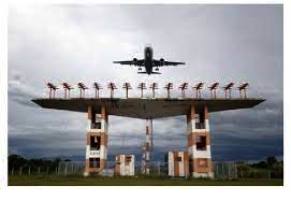The Nigerian Airspace Management Agency (NAMA) says it is working to install Category II Instrument Landing systems (CAT II ILS) in Owerri and Jalingo airports that have no ILS presently.
The agency’s Acting Managing Director, Mr Lawrence Pwajok, said this in a statement issued in Lagos on Monday.
Pwajok said that all airports in the country had a minimum of CAT II ILS, adding that there were no obsolete navigational facilities at the airports.
The NAMA boss said it had invested heavily on navigational facilities more than any other facilities at both federal and state-owned airports to ensure that aircraft operate at any time.
“Apart from one or two private aerodromes, all the federal and state government owned airports managed by NAMA are equipped with Instrument Landing System (ILS)”, he said.
Pwajok frowned at the idea of tagging some airports as “sunrise” or “sunset airports”, given that almost all airports in Nigeria had instrument landing facilities for approach and landing.
He explained that they were operating based on Instrument Flight Rules (IFR) and not based on Visual Flight Rules (VFR) where the pilots were required to visually approach and land within Sunrise to Sunset time.
Explaining further, the NAMA boss said the agency had commenced the implementation of Category III ILS in Abuja and Lagos airports to tackle visibility issues during adverse weather.
According to him, Katsina, Kano and Port Harcourt airports have been installed with the facility and will be ready for use before the end of 2022.
In the area of search and rescue services, he assured airlines that the agency would always be available to provide the service.
On how the agency was managing the single runway being operated in Lagos as a result of ongoing repairs at the 18 Left, Pwajok said it developed contingency procedures for a single runway operation.
“This is against the two runways, and the installation of lighting at the runway will complement the CAT II ILS installed there to bring about 24-hour operation and also serve as backup for the international runway (18 Right).
“It is very important that we address this issue of domestic runway 18 Left which has been in the dark for 20 years.
“It is a difficult thing for the airlines, pilots and air traffic controllers, but we are coping with it.
“This is because we know that it is the only way we can increase operating capacity of the airport when we have two functional runways,” he said.



